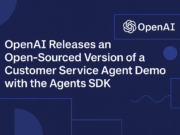As new digital platforms and providers emerge, the problem of conserving customers’ info secure on-line is rising extra complicated – novel applied sciences require novel privateness options. At Google, we proceed to spend money on privacy-enhancing applied sciences (PETs), a household of cutting-edge instruments that assist remedy the essential activity of knowledge processing by offering individuals ensures that their private info is saved personal and safe.
Over the previous decade, we’ve built-in PETs all through our product suite, used them to assist sort out societal challenges and made a lot of our personal freely accessible to builders and researchers world wide by way of open supply tasks.
Immediately we’re excited to share updates on our work with differential privateness, a mathematical framework that permits for evaluation of datasets in a privacy-preserving approach to assist guarantee particular person info isn’t revealed.
Reaching a differential privateness milestone
Differential privateness is a PET not identified by most customers, however one of many unsung heroes behind a few of the most generally used tech options right now. However like many PETs, trade adoption of differential privateness may be difficult for a lot of causes: complicated technical integrations, restricted scalability for giant functions, excessive prices for computing assets and extra.
We’re happy to announce now we have achieved what we all know to be the most important utility of differential privateness on the earth spanning shut to a few billion gadgets over the previous yr, serving to Google enhance merchandise like Google Residence, Google Search on Android and Messages. Utilizing this know-how we had been in a position to enhance the general consumer expertise in these merchandise.
For instance, we had been in a position to establish the basis causes of crashes for Matter gadgets in Google Residence to assist enhance buyer satisfaction. Matter is an trade customary simplifying the arrange and management of sensible residence gadgets throughout sensible residence ecosystems. As Google Residence continued so as to add assist for brand new system sorts, our workforce uncovered and rapidly patched some connectivity points with the Residence app through the use of insights unlocked by our differential privateness instrument.
This three billion system deployment was made potential via six plus years of analysis on our “shuffler” mannequin, which successfully shuffles knowledge between “native” and “central” fashions to realize extra correct evaluation on bigger knowledge units whereas nonetheless sustaining the strongest privateness ensures.
Democratizing entry to differential privateness
Over 5 years in the past, we set out on a mission to democratize entry to our PETs by releasing the first open supply model of our foundational differential privateness libraries. Our purpose is to make most of the identical applied sciences we use internally freely accessible to anybody, in flip reducing the barrier to entry for builders and researchers worldwide.
As a part of this dedication, we open sourced a first-of-its-kind Absolutely Homomorphic Encryption (FHE) transpiler two years in the past and have continued to take away obstacles to entry alongside the best way. We’ve got additionally completed the identical with our work on Federated Studying and different privateness applied sciences like safe multi-party computation, which permits two events (e.g., two analysis establishments) to affix their knowledge and do evaluation on the mixed knowledge with out ever revealing the underlying info.
Since 2019, we’ve expanded entry to those libraries by publishing them in new programming languages to achieve as many builders as potential. Immediately, we’re asserting the discharge of PipelineDP for Java Digital Machine (JVM) known as PipelineDP4j. This work is an evolution of the joint work we’ve completed with OpenMined. PipelineDP4j permits builders to execute extremely parallelizable computations utilizing Java because the baseline language, and opens the door for brand new functions of differential privateness by lowering the barrier of entry for builders already working in Java. With the addition of this JVM launch, we now cowl a few of the hottest developer languages – Python, Java, Go, and C++ – probably reaching greater than half of all builders worldwide.
Moreover, a few of our newest differential privateness algorithms at the moment are serving to energy distinctive instruments like Google Traits. One in every of our mannequin developments now permits Google Traits to offer larger insights into low-volume locales. For differential privateness – and most privateness ensures normally – datasets want to fulfill a minimal threshold to make sure people’ knowledge isn’t revealed. Our new providing may also help professionals like researchers and native journalists get hold of extra insights on smaller cities or areas, and thus shine a light-weight on prime of thoughts subjects. For instance, a journalist in Luxembourg making queries for Portuguese language outcomes can now entry insights that weren’t accessible earlier than.
Auditing for differentially personal algorithms
The elevated adoption of differential privateness each by trade and governments is a serious development in dealing with consumer knowledge in a personal approach. Nonetheless, this widespread adoption may also result in an elevated danger of defective mechanism design and implementation. The huge quantity of algorithms developed on this discipline renders guide inspection of their implementation impractical – and there’s a lack of versatile instruments able to testing the various vary of methods with out vital assumptions.
To permit practitioners to check whether or not a given mechanism violates a differential privateness assure, we’re releasing a library, DP-Auditorium, using solely samples from the mechanism itself, with out requiring entry to any inside properties of the applying.
Efficient testing for a privateness assure entails two key steps: evaluating the privateness assure over a set dataset, and exploring datasets to search out the “worst-case” privateness assure. DP-Auditorium introduces versatile interfaces for each elements, facilitating environment friendly testing and constantly outperforming present black-box entry testers. Most significantly, these interfaces are designed to be versatile, enabling contributions and expansions from the analysis neighborhood, thereby regularly augmenting the testing capabilities of the instrument.
We’ll proceed to construct on our long-standing funding in PETs and dedication to serving to builders and researchers securely course of and shield consumer knowledge and privateness.


















![Diablo 4 Mod Apk Newest Model [Unlimited Excitement]](https://digibytetoday.com/wp-content/uploads/2025/06/1750344127_1-final-180x135.jpg)















